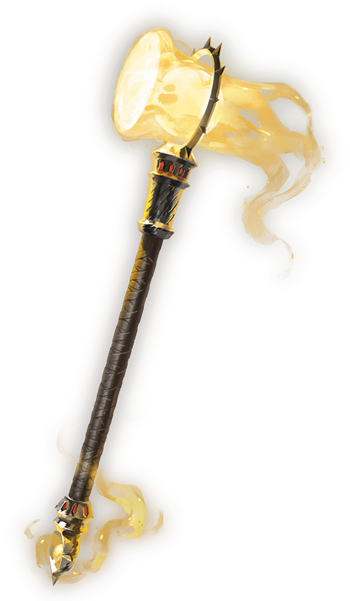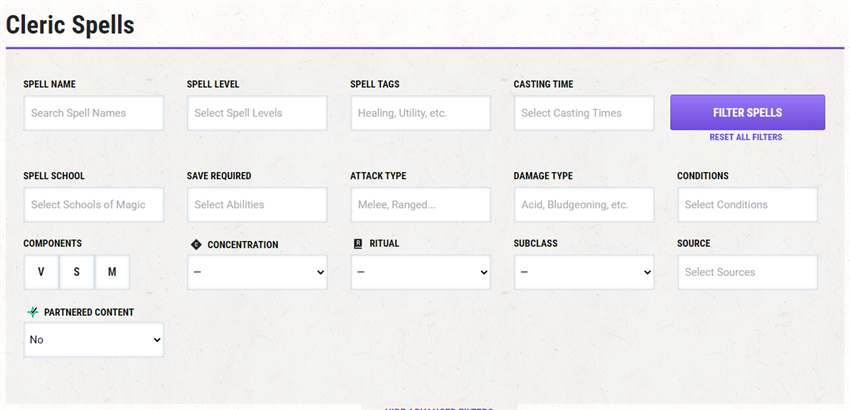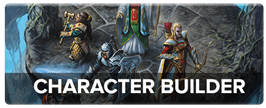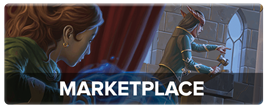 Spell Spotlight examines D&D’s best, worst, and most interesting spells, giving you the tools you need to play a spellcaster who knows exactly what they’re doing. Today, we’re looking at two iconic cleric spells: healing word and spiritual weapon. These spells define the low-level cleric experience, giving characters who master them highly flexible and mobile healing and combat abilities.
Spell Spotlight examines D&D’s best, worst, and most interesting spells, giving you the tools you need to play a spellcaster who knows exactly what they’re doing. Today, we’re looking at two iconic cleric spells: healing word and spiritual weapon. These spells define the low-level cleric experience, giving characters who master them highly flexible and mobile healing and combat abilities.
What is Healing Word?
Healing word is a 1st-level spell available to bards, clerics, druids, and Alchemist artificers. It allows you to heal a creature you can see within 60 feet a number of hit points equal to 1d4 + your spellcasting modifier. For most 1st-level casters, this is an average healing of 4 or 5 hit points. It isn’t quite as strong as cure wounds (which averages 6 or 7 hit points at the same level of play), but its ability to be cast from range and its bonus action casting time make it every bit as powerful as its more classic counterpart.
Though at low levels, the difference between 1d4 of healing and 1d8 of healing may be the difference between healing to half health and healing to full health, this minor distinction practically disappears by the time you and your party reaches 3rd level. This is especially true if you’re a Life domain cleric; your Disciple of Life and Blessed Healer features make healing spells so useful that it hardly matters how much healing the spell itself provides. The mere fact that it heals anything is enough. For example, when casting healing word at 1st level, your Disciple of Life feature adds an extra 3 points of healing—that static bonus nearly doubles the amount of healing the spell provides normally!
A range of 60 feet gives you the ability to heal an injured friend from far away, as long as you have line of sight. Most encounter areas in published D&D adventures aren’t larger than 60 feet in any direction, especially at low levels, so you can effectively heal a friend from anywhere on the battlefield. Even more attractive than its range, however, is its rapid casting time. Since healing word has a casting time of 1 bonus action, as opposed to 1 action, it is incredibly useful for casters who have something else to do as their action. See “Strategies, Synergies, and Struggles” below for a closer look at the power of the bonus action.
What is Spiritual Weapon?
 Spiritual weapon is a 2nd-level spell available to clerics (and Oath of Conquest paladins) that allows them to conjure a weapon that can fly through the air and strike down their foes. This spell deals only a small amount of damage when it’s first cast, dealing only 1d8 + spellcasting modifier damage if it hits. The spell scorching ray is a good spell to compare it to, even though scorching ray is only available to wizards and sorcerers, while spiritual weapon is largely only available to clerics.
Spiritual weapon is a 2nd-level spell available to clerics (and Oath of Conquest paladins) that allows them to conjure a weapon that can fly through the air and strike down their foes. This spell deals only a small amount of damage when it’s first cast, dealing only 1d8 + spellcasting modifier damage if it hits. The spell scorching ray is a good spell to compare it to, even though scorching ray is only available to wizards and sorcerers, while spiritual weapon is largely only available to clerics.
Scorching ray deals damage in large spikes, dealing up to 6d6 fire damage on the turn it’s cast to up to three targets within 120 feet of the caster. On the other hand, spiritual weapon deals a smaller amount of damage spread out over up to a full minute of combat, and doesn’t require concentration. It can be conjured at any point within 60 feet of the caster, making its range less potent than scorching ray, but as noted above, 60 feet is usually more than enough room in small, low-level arenas. If that range isn’t enough, the weapon can move up to 20 feet on each of your turns. The spell’s duration and maneuverability allows it to deal up to a maximum of 10d8 + ten times the caster’s spellcasting modifier over the course of an exceptionally long battle.
A combat encounter that lasts a whole minute of in-game time (that’s ten full rounds of combat!) is an outlandish rarity, however. Few battles last more than 3 rounds, so assuming that the spell deals a total of 3d8 + three times the caster’s spellcasting modifier, its damage is comparable to other 2nd-level spells—an average of 22 damage compared to scorching ray’s average of 21 damage. Spreading the damage out over several rounds is a definite drawback, but spiritual weapon’s versatility (and its hard-to-resist force damage type) make it easy to overlook the consequences its slow-and-steady approach to dealing damage.
Where this spell really shines, however, is in its bonus action casting time and the ability to command it to attack as a bonus action on each of your turns. Most clerics only have a small handful of spells or class features that grant them a bonus action, making it easy to justify using your bonus action to attack with your spiritual weapon on every single turn in combat.
Spellcasting Strategies and Struggles
On the surface, healing word and spiritual weapon are totally different spells; one heals allies, the other hurts enemies. However, there are two main traits that unify these spells: the first is their 60-foot range. These two spells allow the caster to heal and fight well beyond the reach of their hands. With these spells, the battlefield is their oyster.
These spell’s other unifying power, their bonus action casting time, is their greatest strength—and also their greatest weakness. A bonus action casting time is powerful on a turn by turn basis. Being able to cast a healing or damage spell as a bonus action frees up your action for other things—such as making a weapon attack, casting a cantrip, hiding, searching for something, or any number of other Actions in Combat.
Clerics and bards can take the Attack action (which at low levels is often nearly as powerful as a fighter or paladin’s attack), and druids can do the same, especially if they have a quarterstaff empowered by the shillelagh cantrip. Having an action to use after spending a bonus action to heal is useful casters who know offensive cantrips like sacred flame for clerics, primal savagery for druids, or vicious mockery for bards.
Rules Tip: Casting Spells as a Bonus Action
When you cast a spell as a bonus action, you can’t cast another spell in the same turn unless that spell is a cantrip that you cast as an action. Similarly, a bonus action isn’t “inferior” to an action. A spell that has a casting time of 1 bonus action can’t be cast as an action, even though it may seem like an action is superior to a bonus action. Allowing a bonus action spell to be cast as an action is a reasonable house rule to propose to your group, but it’s not part of the official D&D rules.

Since both healing word and spiritual weapon have bonus action casting times, however, this means that they can’t be used together on the same turn. This is even true for the turns after you’ve cast spiritual weapon, since you need to use your bonus action to attack with the weapon on future turns. This bonus action overload means that clerics need to decide whether they want to lean into the role of healing, or the role of offense. You could lessen the impact of this choice by choosing to prepare the slightly less useful cure wounds spell instead of healing word.
Bards and druids have access to healing word, so they’re impacted by this bonus action bottleneck, too! Even though they don’t have spiritual weapon on their class’s spell lists, they still have other spells and class features that require a bonus action to use. A bard can’t cast healing word and give someone Bardic Inspiration. A druid can’t cast healing word and also cast shillelagh—though they can attack with a weapon affected by shillelagh once the spell has been cast.
If you’re playing a spellcaster and want to create a powerful character, try to make sure you can reliably do something with both your action and your bonus action on a turn. You don’t have to always use both (since this can slow down play and hog the spotlight) but having the option to do two cool things per turn instead of one makes you more likely to have fun and effective turns. Bonus action spells can help you do that if you don’t have many class features that can be used as a bonus action (e.g., Bardic Inspiration, Combat Wild Shape, etc.).

If you want to see what spells you can cast as a bonus action, go the Game Rules dropdown at the top of the page, find the Spells header, and click on your class’s name. This will take you to your class’s fully searchable spell list. Once there, open the Show Advanced Filters menu and type “1 Bonus Action” into the Casting Time bar. Hit Filter Spells, and that will show you all the spells on your class’s spell list that can be cast as a bonus action. Have fun discovering small combos, like casting word of radiance as an action on a group of enemies surrounding you, and then immediately casting sanctuary on yourself as a bonus action to avoid retaliation.
What are your favorite bonus action + action combos? What other spells do you want to see spotlighted in Spell Spotlight? Let us know in the comments!
Create A Brand-New Adventurer Acquire New Powers and Adventures Browse All Your D&D Content
 James Haeck is the lead writer for D&D Beyond, the co-author of Waterdeep: Dragon Heist, Baldur's Gate: Descent into Avernus, and the Critical Role Explorer's Guide to Wildemount, a member of the Guild Adepts, and a freelance writer for Wizards of the Coast, the D&D Adventurers League, and other RPG companies. He lives in Seattle, Washington with his fiancée Hannah and their animal companions Mei and Marzipan. You can find him wasting time on Twitter at @jamesjhaeck.
James Haeck is the lead writer for D&D Beyond, the co-author of Waterdeep: Dragon Heist, Baldur's Gate: Descent into Avernus, and the Critical Role Explorer's Guide to Wildemount, a member of the Guild Adepts, and a freelance writer for Wizards of the Coast, the D&D Adventurers League, and other RPG companies. He lives in Seattle, Washington with his fiancée Hannah and their animal companions Mei and Marzipan. You can find him wasting time on Twitter at @jamesjhaeck.











-
View User Profile
-
Send Message
Posted Jun 29, 2020That's correct. Bonus actions aren't inferior to normal actions, and they aren't interchangeable. You can't cast a spell that has a casting time of 1 bonus action if you've already used your one bonus action for the turn for any other reason. If you're a goblin sorcerer and can use Nimble Escape to Hide or Dash as a bonus action, you longer have a bonus action to use to cast that spell.
-
View User Profile
-
Send Message
Posted Jun 30, 2020"What is Spiritual Weapon" - Oh... just one of the best spells in the game for any class!
-
View User Profile
-
Send Message
Posted Jun 30, 2020Gonna be honest, my War Cleric dominates with the classic Spiritual Weapon attack, followed right by a normal Longsword attack.
At eighth level, that’s 3d8 + 9 damage on each turn, which pretty much makes me the master of combat with my AC of 21. I’m not even Min-Maxing!
-
View User Profile
-
Send Message
Posted Jun 30, 2020the other major thing with spiritual hammer I didnt spot in your article is that it is not a concentration spell, so you can still do a full range of casting during that minute of combat, which is very useful, especially when coupled with spirit guardians (which does) helping really up your control and damage output while still letting you wave your weapons or case some other spells or actions.
-
View User Profile
-
Send Message
Posted Jun 30, 2020Another fun, easy to read article. I like that this one is aimed at informing players, rather than really interrogating the uses of the spell - but I like those articles too!
-
View User Profile
-
Send Message
Posted Jun 30, 2020When my cleric of Bacchus casts spiritual weapon, it takes the form of a hangover angel that hits people in the head with a "regretful hammer"
-
View User Profile
-
Send Message
Posted Jul 2, 2020Ahahaah, that's awesome.
-
View User Profile
-
Send Message
Posted Jul 3, 2020I still think making Healing word a Bonus Action was a big mistake.
I kinda dislike spells that can just pop a fallen allie back up on their feet without having the party lose a single step in action economy… Getting knocked out is kinda unthreatening in D&D as it is...
-
View User Profile
-
Send Message
Posted Jul 3, 2020Depends on your DM, I suppose? Ours makes sure that once we go down, we stay down. The mobs almost always make sure we "properly die" before the healer can pop us back up, so the healer needs to get in close for a Revivify.
-
View User Profile
-
Send Message
Posted Jul 5, 2020Rough!!
-
View User Profile
-
Send Message
Posted Jul 5, 2020Plus the big thing of when you don't have to at range hit someone. Or perhaps pretend it is in your offhand as some sort of divine weapon if you want to put a few other skills like deception or performance to use. Cool for an image, but unless you are busting out bonus actions often. Spiritual weapon is a very strong option.
Healing word is nice if someone is about to die from death saves. like if they have one, it is better than risking a foe to attack a downed body or a nat 1. It isn't that often, but a 'for funsies' roll and that nat 1 pops up. You feel extra good. If you get beacon of hope up. It actually can be pretty good if you have to fill a support/damage turn.
-
View User Profile
-
Send Message
Posted Jul 7, 2020@ Rod The Bard Yeah. Was gonna point that out but came across your comment. Can’t use two actions in one turn as only wizard.
-
View User Profile
-
Send Message
Posted Jul 8, 2020I'm playing a conquest paladin, and I feel like a monster on the battlefield. Lots of stuff competing for my bonus action and reaction, but the combo of 2 attacks + ability to smite + spiritual weapon is A LOT. Almost feels broken that you can get it on a paladin.
-
View User Profile
-
Send Message
Posted Jul 9, 2020cool
-
View User Profile
-
Send Message
Posted Jul 10, 2020I think they mean having it integrated into the dnd beyond roll programming. Because as it stands, you have to remember Disciple of Life and add it on top of the healing Hit Points "manually" rather than having it add automatically.
-
View User Profile
-
Send Message
Posted Jul 10, 2020Good point! I'm sure I'll eventually stop forgetting to add it to my healing spells but having racial and class features integrated to rolls would be AMAZING!
-
View User Profile
-
Send Message
Posted Jul 12, 2020The biggest issue with spiritual weapon I experienced as cleric is that I've hit with it so little, that |I can count it on my fingers, while I've used it almost always in battles. Dunno, might be my luck.
-
View User Profile
-
Send Message
Posted Jul 12, 2020Yeah,
Spiritual weapon is quite broken. A superior 2nd level spell. Bonus action to attack, favorable scaling with higher slots, NO CONCENTRATION. Wow. I'd ask folks to compare what is a better spell -Mordinkainan's (sp) Sword at 7th level for a Wizard, or Spiritual Weapon for 2nd clerics.
Highly recommend a homebrew that reverses which of the two spells has concentration above as a starting point to make it scale properly.
Only Spirit Guardians and Bless are perhaps more impactful for breaking the game as cleric spells.
-
View User Profile
-
Send Message
Posted Jul 12, 2020Yep. Which is why is quite an outlier good of a spell, per my post in terms of the lack of thought to scaling. What 13th level Wizard in their right mind would cast Mordinkainan's Sword, which isn't even as good as Spiritual Weapon is for a 3rd level cleric.
-
View User Profile
-
Send Message
Posted Jul 12, 2020Yeah. This is why both the spells listed above are broken, and need house rules bad to help poor DMs actually challenge a party properly! Why does spirit guardians also cause difficult terrain? Why does it move with the caster and last forever? Why does Antilife Shell, a not as good spell that only hedges creatures dispel when you force it in someone? Why is Antilife shell 5th level and Spirit Guardians 3rd?
The answer to all of the above is lack of balance,advance pkaytest perhaps, and insufficient errata. Thry errata'd healing spirit, but not these spells among others. ;)